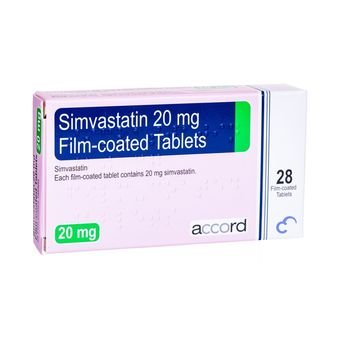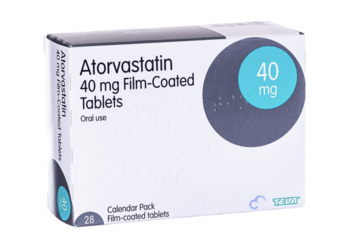High Cholesterol

More information
Introduction
Cholesterol is a waxy substance produced by the liver. High cholesterol levels can block arteries and lead to serious health problems. Six out of ten adults in the UK have high cholesterol, although many won’t know that they have it.
Order Statins Online
You can order statins to treat high cholesterol from Cloud Pharmacy. Simply complete a medical assessment form and our clinical team will assess your suitability for the medicine. If your order is approved, our clinical team will pass a prescription to our pharmacy team. Our pharmacy team will check the prescription and dispatch it securely to your delivery address.
Statins are effective medicines for lowering cholesterol and can be prescribed to reduce the risk of developing heart disease. Visit the NHS website for more information on statins.
You can be sure you are receiving your medication from a safe, reliable online pharmacy in the UK.
Treatments
More information
Once an online consultation has been been approved by our medical team, our pharmacy will safely prepare and ship your treatment to you in discreet packaging using Royal Mail or DPD.
What Is Cholesterol?
Cholesterol is a waxy substance similar to the fat that is produced by the liver. It is important for cell membrane formation, as well as the production of vitamin D and some hormones.
Lipoproteins are particles that help transport cholesterol through your bloodstream. There are ‘good’ high-density lipoproteins (HDLs) and ‘bad’ non-high-density lipoproteins (non-HDLs). Non-HDLs build up in the arteries and can lead to health problems, while HDLs help to return the non-HDLs to the liver where they are eliminated.
What Is High Cholesterol?
When we refer to ‘high cholesterol’, this means high levels of non-HDLs. If your cholesterol levels are high and non-HDLs build up in your arteries, it could lead to serious health issues such as stroke or heart attack. There are things you can do to lower your cholesterol, including sticking to a healthy diet, exercising regularly, and stopping smoking. There are also medicines that can reduce your cholesterol levels.
Types of Cholesterol
As we have outlined, there are two main types of cholesterol, high-density lipoproteins (HDL) and non-high-density lipoproteins (non-HDL). Here is more information on these two cholesterol types:
High-Density Lipoproteins (HDL)
This is the good cholesterol, which helps to take the bad cholesterol out of your blood. HDLs remove non-HDLs and transport them to the liver, where they are broken down before being passed out of the body.
Non-High-Density Lipoproteins (Non-HDL)
Non-HDL is the 'bad' cholesterol. When there is an excess of it, non-HDL can build up inside your blood vessel walls, which leads to clogs that narrow the arteries. This can cause an increased risk of heart disease.
Triglycerides
Like cholesterol, triglycerides are fatty substances (lipids). They are stored in your fat cells. People who are overweight and eat sugary or fatty foods, or drink a lot of alcohol, may have a high triglyceride level. Like non-HDLs, triglycerides can also contribute to the artery walls narrowing, increasing your risk of serious health problems. You might have a high triglyceride level even if you have normal HDL and non-HDL levels.
High Cholesterol Symptoms
Typically, there aren't any symptoms of high cholesterol. But high cholesterol can be indicated by emergency events such as a heart attack or stroke. A blood test is the only way to know if your cholesterol level is too high – that’s why it can be important to get checked.
After the age of 20, you should get checked every four to six years. If you have high blood pressure, are overweight or smoke, your doctor may recommend that you get checked more frequently.
What Causes High Cholesterol?
High cholesterol has various potential causes, some of which you can control, and others that you can’t. Controllable factors include:
- Not exercising regularly enough
- Eating too much food that is high in saturated fat
- Having an excess of body fat, particularly around the midriff
- Smoking
Factors that you can’t control include:
- Being a man (men are more likely to have high non-HDL levels)
- Being older
- Having familial hypercholesterolaemia, a type of high cholesterol that you are born with
- Having certain an ethnic background – black or South Asian people are more likely to develop high cholesterol
- Having endocrine disorders such as underactive thyroid
- Having kidney disease
- Having liver disease
What Should Your Cholesterol Levels Be?
There are several factors to consider when measuring someone's cholesterol, including age and gender. A simple blood test is all that is needed to measure your cholesterol levels. This involves providing a blood sample at your local hospital or clinic. The blood is then checked for HDL and non-HDL levels, as well as triglycerides. A total cholesterol result will also be recorded.
Cholesterol is measured in millimoles per litre of blood – this is abbreviated to 'mmol/Litre' or 'mmol/L'. In general, a higher HDL level and low non-HDL level are ideal for a healthy heart.
The Dangers of High Cholesterol
If you have been diagnosed with a high cholesterol level, that means you have too much of the ‘bad’ non-HDL cholesterol in your bloodstream. This increases your risk of stroke, heart attack or vascular dementia. It is also important to have a high level of ‘good’ HDL cholesterol because that limits the non-HDL level by transporting this ‘bad’ cholesterol to the liver.
The dangers of high cholesterol are augmented by other risk factors, such as smoking, not getting enough exercise, high blood pressure, diabetes, ethnic background, family history and being overweight. Together, high cholesterol and these risk factors increase the chances of developing a heart or circulatory disease.
Diabetes and High Cholesterol
As we mentioned in the section above, diabetes is linked to high cholesterol. You are more likely to develop type 2 diabetes if you have high cholesterol. Poor blood sugar control can contribute to poor cholesterol levels. If you have your blood sugar under control, you might still have low HDL levels and high triglycerides.
A combination of diabetes, low HDL levels, high non-HDL levels and high triglycerides is known as a condition called diabetic dyslipidemia. Up to 70% of people who have type 2 diabetes also have diabetic dyslipidemia.
How to Reduce Cholesterol Levels
If you suffer from high cholesterol, there are certain things you can do to manage this, these include:
- Exercise regularly: exercising on the majority of days raises HDL levels (good cholesterol). Aim for 30 minutes per day if you can.
- Eating healthy foods: a diet which is low in trans fat and saturated fat, and high in fibres and omega-3 fatty acids, can help to keep your cholesterol at the right levels.
- Lose weight: carrying extra weight, particularly around the midriff, can contribute to high cholesterol levels.
- Drink alcohol in moderation: drinking too much can contribute to high cholesterol levels and lead to serious health problems.
- Stop smoking: this will improve your cholesterol levels, and offer a range of other health benefits including better blood circulation and lung function.
High Cholesterol Treatment
Alongside recommending exercise, a healthy diet and weight loss, your doctor may prescribe you medication such as simvastatin. Simvastatin and other medicines in the HMG-CoA reductase inhibitors (statins) class – including atorvastatin and pravastatin – help to decrease elevated lipid levels and reduce the risk of heart problems.
Simvastatin is available at Cloud Pharmacy on prescription. A doctor will need to assess your suitability for the medication before you are able to purchase simvastatin online. Once you have completed a short consultation for simvastatin - including a short questionnaire, your prescription can then be issued. Cloud Pharmacy will then send your medication directly to your address by next-day delivery.
Guides
How it works
First...
Complete a quick eligibility check
Then...
Order your treatment
Finally.
Fast, confidential delivery to your door





















